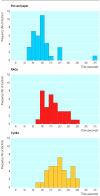Computer support for interpreting family histories of breast and ovarian cancer in primary care: comparative study with simulated cases
- PMID: 10875832
- PMCID: PMC27423
- DOI: 10.1136/bmj.321.7252.28
Computer support for interpreting family histories of breast and ovarian cancer in primary care: comparative study with simulated cases
Abstract
Objectives: To evaluate the potential effect of computer support on general practitioners' management of familial breast and ovarian cancer, and to compare the effectiveness of two different types of computer program.
Design: Crossover experiment with balanced block design.
Participants: Of a random sample of 100 general practitioners from Buckinghamshire who were invited, 41 agreed to participate. From these, 36 were selected for a fully balanced study.
Interventions: Doctors managed 18 simulated cases: 6 with computerised decision support system Risk Assessment in Genetics (RAGs), 6 with Cyrillic (an established pedigree drawing program designed for clinical geneticists), and 6 with pen and paper.
Main outcome measures: Number of appropriate management decisions made (maximum 6), mean time taken to reach a decision, number of pedigrees accurately drawn (maximum 6). Secondary measures were method of support preferred for particular aspects of managing family histories of cancer; importance of specific information on cancer genetics that might be provided by an "ideal computer program."
Results: RAGs resulted in significantly more appropriate management decisions (median 6) than either Cyrillic (median 3) or pen and paper (median 3); median difference between RAGs and Cyrillic 2.5 (95% confidence interval 2.0 to 3.0; P<0.0001). RAGs also resulted in significantly more accurate pedigrees (median 5) than both Cyrillic (median 3.5) and pen and paper (median 2); median difference between RAGs and Cyrillic 1.5 (1.0 to 2.0; P<0.0001). The time taken to use RAGs (median 178 seconds) was 51 seconds longer per case (95% confidence interval 36 to 65; P<0.0001) than pen and paper (median 124 seconds) but was less than Cyrillic (median 203 seconds; difference 23. (5 to 43; P=0.02)). 33 doctors (92% (78% to 98%)) preferred using RAGs overall. The most important elements of an "ideal computer program" for genetic advice in primary care were referral advice, the capacity to create pedigrees, and provision of evidence and explanations to support advice.
Conclusions: RAGs could enable general practitioners to be more effective gatekeepers to genetics services, empowering them to reassure the majority of patients with a family history of breast and ovarian cancer who are not at increased genetic risk.
Figures
Comment in
-
Family histories of cancer in primary care. Referrals might be made on the basis of women's anxiety.BMJ. 2000 Oct 14;321(7266):955. BMJ. 2000. PMID: 11030695 Free PMC article. No abstract available.
-
Family histories of cancer in primary care. Nurse led clinic may provide better service than computer program.BMJ. 2000 Oct 14;321(7266):955. BMJ. 2000. PMID: 11030696 No abstract available.
References
-
- Collins FS. Preparing health professionals for the genetic revolution. JAMA. 1997;278:1285–1286. - PubMed
Publication types
MeSH terms
LinkOut - more resources
Full Text Sources
Other Literature Sources
Medical

